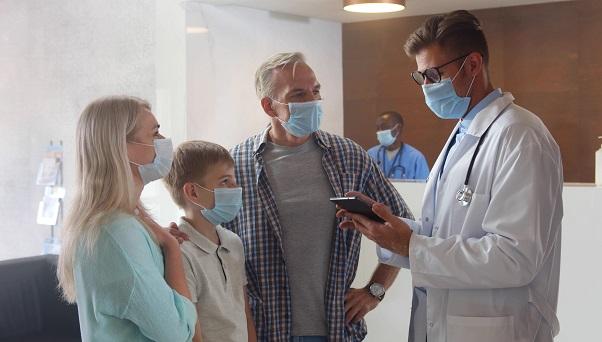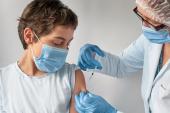MRI of Vaccine-Induced Myocarditis Yields New Theories, Questions
Most cases were short-lived and benign, but early evidence of LGE warrants following for potential myocardial scarring.

A small case series using comprehensive cardiac imaging to assess myocarditis following mRNA vaccination for COVID-19 is providing more reassurance that the phenomenon tends to resolve relatively quickly and follow a benign course. Whether any imaging markers portend longer-term problems, however, remains unclear.
Between May 1 and July 15, 2021, 15 patients ranging in age from 12 to 18 years presented to a large US children’s hospital following vaccination with BNT162b2 (Pfizer/BioNTech) for COVID-19, all with elevated cardiac troponin levels and chest pain. LV function was normal at presentation in most patients and normalized within a few days in all but one adolescent, who had persistently borderline low LVEF.
Importantly, none required admission to the ICU and all were discharged alive.
“Acutely, the kids weren’t very sick,” lead investigator Audrey Dionne, MD (Boston Children’s Hospital, MA), told TCTMD. “They were admitted, but most of them went home within 2 to 5 days without significant complications. The one thing that is somewhat concerning is that most of them, at least on cardiac MRI, had evidence of cardiac involvement.”
In the series, which was published August 10, 2021, in JAMA Cardiology, late gadolinium enhancement (LGE) was evident in 12 patients, which in this acute setting likely represents inflammation, said Dionne. However, LGE might also be related to myocyte necrosis. For this reason, the long-term implications of myocarditis in these young people are unknown. Dionne said the researchers plan to repeat imaging in a few months to determine if the LGE went away or if the adolescents developed myocardial scarring.
“That would be more of a cause for concern,” she said. “I think we can be reassured [about the findings] at this point, but I wouldn’t be overly reassured.”
Myocarditis Linked to mRNA Vaccines
Several reports to date have shown a higher-than-expected rate of myocarditis or pericarditis following SARS-CoV-2 vaccination with the mRNA-based vaccines (Pfizer/BioNTech and Moderna). The Centers for Disease Control and Prevention (CDC), which has been tracking adverse events along with the Food and Drug Administration, has said there is an association between COVID-19 mRNA vaccines and myocarditis/pericarditis, particularly in young males.
Just last week, researchers published electronic medical record data from more than 2 million patients who received a COVID-19 vaccine, reporting an incidence of myocarditis of 1.0 case per 100,000 shots. The incidence of pericarditis was slightly higher at 1.8 cases per 100,000 doses, but both syndromes were short-lived and all patients recovered. However, the risks of myocarditis and pericarditis were higher than in previous reports, including those from the CDC and FDA.
Acutely, the kids weren’t very sick. They were admitted, but most of them went home within 2 to 5 days without significant complications. Audrey Dionne
To TCTMD, Dionne said that as research emerged that myocarditis might be a potential risk following mRNA vaccination for COVID-19, they put together a working group of cardiologists, infectious disease experts, and imaging specialists to discuss how best to evaluate and manage such patients. Their protocol includes a measurement of cardiac troponin levels and an ECG, as well as detailed cardiac imaging with an echocardiogram and MRI.
All patients in this report received the Pfizer/BioNTech vaccine. Fourteen of the adolescents were male, and symptoms occurred after the second dose in all but one patient. Chest pain, which occurred in every patient, started roughly 3 days after vaccination, while ten also had a fever, eight had myalgia, and six had headaches.
On echo, three patients had global LV systolic ventricular dysfunction (EF ranged from 44% to 53%), two had systolic dysfunction with abnormal diastolic function, and one had borderline EF. One-third of patients had abnormal global longitudinal or circumferential strain. On cardiac MR, the findings were consistent with myocarditis in 13 of the 15 patients, most notably with LGE evident in 12 patients. In addition, regional hypersensitivity on T2-weighted imaging was seen in two patients, elevated extracellular volume fraction in three patients, and elevated LV global native T1 in two patients.
Benign Course, but Follow-Up Needed
In follow-up, which ranged from 1 to 13 days after hospital discharge, symptoms resolved in 11 patients. For the four with remaining symptoms, fatigue was reported in three while one had continued chest pain. ECG changes persisted in four patients, and one had a nonsustained ventricular tachycardiac on ambulatory monitoring.
“One of the things that was most striking is that when we think of myocarditis related to viruses or other infections, we think of sick kids in the ICU who will require support,” said Dionne. “With a lot of the postvaccine myocarditis cases, they had chest pain and evidence of involvement of the heart muscle, but most of them appeared well. None of them required the ICU or needed any support. That’s a big difference acutely.”
And while the vaccine-linked cases of myocarditis suggest an uncomplicated short-term course, Dionne stressed that the long-term implications are not yet known. That information, she added, is needed for physicians to help patients and families fully assess the risks and benefits of vaccination.
“Obviously, we don’t want kids to present to us with myocarditis and require admission, but the risks need to be balanced with the risks of COVID-19,” said Dionne. “For the past few weeks, with the [Delta] variant, we’ve seen that kids can be more severely affected with COVID. Any decision or recommendation about the risks and benefits of vaccination need to take into account the risk of severe COVID infection. It’s actually not an easy question to answer. Hopefully, as we learn more about the long-term risks—both of COVID and myocarditis—we’ll be better able to guide patients and families about how to make decisions.”
Michael O’Riordan is the Managing Editor for TCTMD. He completed his undergraduate degrees at Queen’s University in Kingston, ON, and…
Read Full BioSources
Dionne A, Sperotto F, Chamberlain S, et al. Association of myocarditis with BNT162bs messenger RNA COVID-19 vaccine in a case series of children. JAMA Cardiol. 2021;Epub ahead of print.
Disclosures
- Dionne reports no relevant conflicts of interest.





Comments